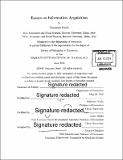Essays on information acquisition
Author(s)
Denti, Tommaso
DownloadFull printable version (11.61Mb)
Other Contributors
Massachusetts Institute of Technology. Department of Economics.
Advisor
Muhamet Yildiz and Juuso Toikka.
Terms of use
Metadata
Show full item recordAbstract
Economic agents often do not interact on the basis of some fixed prior information: choosing what to know is a central part of their interaction. The essays composing this thesis provide and apply theoretical tools to understand information as a choice variable. In the first essay on "Unrestricted Information Acquisition," I study costly information acquisition in games where players can acquire information not only about the state, but also about one another's information in a flexible way. Two main patterns emerges. First, in coordination games, players have a strong incentive to learn what others know: for instance, I show that this can explain the onset of phenomena such as bank runs or currency crises. Second, this incentive weakens as the game gets large and players small: for instance, I show that this leads nonfundamental volatility to vanish in many canonical large games. In the second essay on "Endogenous Informational Smallness," I deepen the investigation of unrestricted information acquisition in large games and show that players end up being informationally small in equilibrium. Information is valuable, but also costly: this is the tradeoff that makes information an economic good. Understanding the cost of information is challenging, since it usually reflects unobservable factors such as time, effort, and cognitive resources. In the third co-authored essay on "Rationally Inattentive Preferences," I highlight basic properties of the cost of information that can be assumed without loss of generality and are necessary and sufficient for identification from observable menu-choice data.
Description
Thesis: Ph. D., Massachusetts Institute of Technology, Department of Economics, 2016. Cataloged from PDF version of thesis. Includes bibliographical references (pages 154-160).
Date issued
2016Department
Massachusetts Institute of Technology. Department of EconomicsPublisher
Massachusetts Institute of Technology
Keywords
Economics.